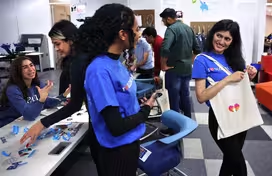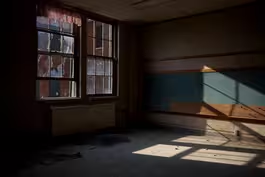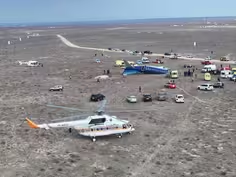
Assad regime made billions producing, exporting party drugs
Clip: 12/26/2024 | 8m 31sVideo has Closed Captions
How the Assad regime made billions producing and exporting party drugs
Now that the Assad regime in Syria has fallen, the full scale of that government’s production and distribution of illicit drugs is coming to light. Leila Molana-Allen reports from the drug factories in Syria.
Problems playing video? | Closed Captioning Feedback
Problems playing video? | Closed Captioning Feedback
Major corporate funding for the PBS News Hour is provided by BDO, BNSF, Consumer Cellular, American Cruise Lines, and Raymond James. Funding for the PBS NewsHour Weekend is provided by...

Assad regime made billions producing, exporting party drugs
Clip: 12/26/2024 | 8m 31sVideo has Closed Captions
Now that the Assad regime in Syria has fallen, the full scale of that government’s production and distribution of illicit drugs is coming to light. Leila Molana-Allen reports from the drug factories in Syria.
Problems playing video? | Closed Captioning Feedback
How to Watch PBS News Hour
PBS News Hour is available to stream on pbs.org and the free PBS App, available on iPhone, Apple TV, Android TV, Android smartphones, Amazon Fire TV, Amazon Fire Tablet, Roku, Samsung Smart TV, and Vizio.
Providing Support for PBS.org
Learn Moreabout PBS online sponsorshipWILLIAM BRANGHAM: Now that the Assad regime in Syria has fallen, the full scale of that government's production and distribution of illicit drugs is coming to light.
Leila Molana-Allen reports from the drug factories inside Syria.
LEILA MOLANA-ALLEN: Damascus, the epicenter of Bashar al-Assad's web of control.
Now his regime's carefully guarded secrets are being unlocked.
We're driving up into the mountains on the outskirts of Damascus, heading for a large Captagon facility that rebel fighters discovered when they took the city.
As we pull up outside an unremarkable warehouse, you would never know it was the lifeblood of an organized crime network.
The only sign of anything amiss here are the rebel fighters stationed outside, and empty bullet casings scattered across the parking lot.
A fighter leads us into the darkness.
We're inside a cavernous basement of a former food factory, and when you walk inside, suddenly in front of you, pallets full of Captagon packed and ready to be smuggled, and there it is.
That's a Captagon pill, and those two little semicircles mark it.
This former corn chip factory was seized and repurposed after the owner fled five years ago, now, in place of corn and flavorings, bags of chemicals stacked along the walls.
This is the room where they actually made the pills.
You can see it was hastily abandoned because some of this liquid from the mixture of chemicals is still drying in some of the pots.
Come over here.
This is a pallet with the little shapes into which they would pour the mixed chemicals and harden the pills.
Against the walls, bunks, where workers slept here in shifts to produce high quantities of the drug at speed.
Factories like this have been found across Syria.
This is one of the largest.
The rebels who discovered this production facility think there are at least 2.5 million pills just in this room.
There are millions of dollars' worth of drugs stacked on these pallets, and this is how they were smuggling it.
This is a household voltage regulator.
When you open it up, there's a drum inside.
But break through and, inside that drum.
Captagon pills.
Abu Rashid, one of the HTS fighters guarding the factory, says they weren't surprised to find such quantities.
ABU RASHID, Hay'at Tahrir al-Sham Fighter (through translator): What he's done here is produce drugs to destroy a whole generation of people just to increase his own wealth and his power.
LEILA MOLANA-ALLEN: Captagon wasn't just a party drug.
It's been used by fighters in the region for years to keep them alert and inexhaustible on the battlefield.
HTS members we spoke to didn't want to answer whether the group's fighters had ever used the drug or if they're worried they might again.
The workers here burned documents showing where the drugs were due to be shipped before they fled.
But, in the adjoining rooms, we found evidence of other methods of smuggling them out.
This has been painted to look like a pomegranate and, inside, styrofoam filling with a little pocket for the Captagon.
This will be shipped as though it was fruit.
Cardboard fruit boxes litter the floor.
We know these pills were bound overseas.
The boxes are marked for export.
Bashar's brother Maher, who also led some of the most feared military forces, spearheaded the highly organized expansion of Captagon facilities in Syria and Hezbollah-run areas of Lebanon's Beqaa Valley after the country's economic collapse from 2019 drove Lebanese to desperate measures to survive.
In recent years, Captagon has found its way across the sea into Gulf nations, becoming one of the most widely used party drugs in countries like Saudi Arabia and the UAE, gaining popularity, as it's more discreet than alcohol.
Gulf governments desperate to crack down on the drugs flooding their cities last year began to renormalize relations with the Syrian regime, hoping the Assads would turn off the tap if given the right incentives.
Syria's regime created the problem and then benefited from their illegal trade, both financially and politically.
The Captagon trade brought in about $10 billion a year globally.
Varying estimates say the Syrian government, which manufactured 80 percent of the supply, pocketed between $3 billion to $5 billion of that itself.
Across Syria, as the regime's strongholds are broken open, incriminating documents, bereaved families and Captagon.
One of the most feared and brutal branches of Assad's police state was air force intelligence.
At this Syrian air force base in Damascus, families came to search for signs of disappeared loved ones.
FAIDA AL SAEED, Sister of Missing Prisoner (through translator): Ever since this prison was liberated, we have been searching for his name or any thread that might lead us to him.
But it's all in vain.
LEILA MOLANA-ALLEN: This is the air force base Assad used to launch barrel bombs and chemical weapons attacks on his people.
It's now clear it wasn't just a launchpad for death, in every detainment cell, evidence this place served as a torture chamber too.
As prisoners flooded out, searching families flooded in.
Alongside civilian I.D.
cards and abandoned interrogation files, they discovered piles of regime-manufactured drugs.
This man came to look for his relative.
What he found was piles of the drugs which paid for the weapons that destroyed his neighborhood.
MAN (through translator): The Captagon of Bashar al-Assad and his brother Maher.
May they be cursed.
This is the country's filth.
MAN (through translator): I have friends in Saudi Arabia and the Gulf.
They told me it's so easy to find Syrian Captagon there, and it's so cheap, any child could get it.
LEILA MOLANA-ALLEN: After half-a-century of being monitored and informed upon with spies on every corner, there's still uncertainty here about what's safe and who's watching.
Furious but nervous, these men asked us not to use their real names.
MAN (through translator): Assad has been smuggling since the beginning of his rule.
He's traded away our souls for money.
And then he slaughtered us using the weapons he bought with our own money too.
LEILA MOLANA-ALLEN: Across the country, the new authorities are doing their best to dispose of this stockpile.
But there's widespread concern that, while the large facilities will be shut down, the drug has become such a mainstay of Syria's black economy in recent years that small, secret producers may try to keep going.
Caroline Rose has studied the Assad's Captagon trade for years.
CAROLINE ROSE, Director of the Strategic Blind Spots Portfolio, New Lines Institute: All of a sudden, almost seemingly overnight, in 2018, 2019 and especially after 2020, we started to see Captagon seizures in not only the thousands, but the hundred thousands and in some cases the millions.
So, really, what changed here was the industrial scale capacity that state actors and state-aligned actors in Syria were able to commandeer.
Captagon is extremely addictive.
It is a stimulant that over time and over frequent use can cause psychosis.
Ultimately, Captagon does allow fighters to stay up late.
It allows them to stave meals.
It can sometimes produce a feeling of invincibility or euphoria that reportedly helps them focus and perpetrate attacks and fire against adversaries.
LEILA MOLANA-ALLEN: The rebel alliance now becoming Syria's caretaker government says it's going to shut down all these facilities, destroy all the pills.
Can they get rid of Captagon completely?
CAROLINE ROSE: I think that's going to be a much -- a harder thing for the new transitional government to tackle, simply because there are a few individuals and remnants of the regime's security apparatus that have knowledge of how to chemically create and manufacture Captagon in many different ways.
There will be many illicit smugglers that will seek to set up shop in Iraq, in Lebanon, in Turkey as a result of this crackdown.
LEILA MOLANA-ALLEN: The little white pills that fueled a dictator, his reign is over.
Wiping out the criminal networks he left behind may prove less decisive.
For the "PBS News Hour," I'm Leila Molana-Allen in Damascus, Syria.
As Arctic warms, communities face dramatic changes
Video has Closed Captions
Clip: 12/26/2024 | 3m 57s | As Arctic warms, Indigenous communities there face dramatic changes to their way of life (3m 57s)
Claressa Shields on new film 'The Fire Inside'
Video has Closed Captions
Clip: 12/26/2024 | 7m 27s | Claressa Shields on 'The Fire Inside,' new film chronicling her journey to Olympic gold (7m 27s)
Colleges advise students to return before Trump takes office
Video has Closed Captions
Clip: 12/26/2024 | 8m 10s | Colleges advise some international students to return to U.S. before Trump takes office (8m 10s)
Investigation finds more deaths at Native boarding schools
Video has Closed Captions
Clip: 12/26/2024 | 6m 53s | Investigation reveals higher death toll at Native American boarding schools (6m 53s)
Russian system may have downed airliner, U.S. official says
Video has Closed Captions
Clip: 12/26/2024 | 9m 57s | Russian anti-aircraft system may have downed Azerbaijani plane, U.S. official says (9m 57s)
Providing Support for PBS.org
Learn Moreabout PBS online sponsorship
- News and Public Affairs

FRONTLINE is investigative journalism that questions, explains and changes our world.

- News and Public Affairs

Amanpour and Company features conversations with leaders and decision makers.












Support for PBS provided by:
Major corporate funding for the PBS News Hour is provided by BDO, BNSF, Consumer Cellular, American Cruise Lines, and Raymond James. Funding for the PBS NewsHour Weekend is provided by...




